
Julius Arthur Hemphill was a jazz composer and saxophone player. He performed mainly on alto saxophone, less often on soprano and tenor saxophones and flute.
The Black Artists Group (BAG) was a multidisciplinary arts collective that existed in St. Louis, Missouri, from 1968 to 1972. BAG is known for the convergence of free jazz and experimental theater.

Joseph Bowie is an American jazz trombonist and vocalist. The brother of trumpeter Lester Bowie, Joseph is known for leading the jazz-punk group Defunkt and for membership in the Ethnic Heritage Ensemble.

Donald Moye, Jr., known as Famoudou Don Moye, is an American jazz percussionist and drummer. He is most known for his involvement with the Art Ensemble of Chicago and is noted for his mastery of African and Caribbean percussion instruments and rhythmic techniques.
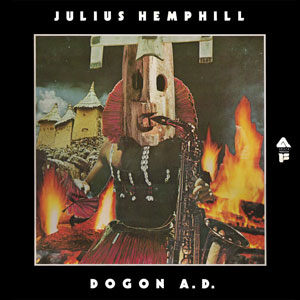
Dogon A.D. is an album by saxophonist Julius Hemphill. It was recorded in February 1972 in St. Louis, Missouri, and was initially released on LP in limited quantities later that year by Hemphill's own Mbari Records, a label he created for the express purpose of issuing his own music. The album was reissued on LP by the Freedom label in 1977, and was reissued on CD in 2011, with extra liner notes and reproductions of the artwork from both the Mbari and Freedom releases, by International Phonograph. A fourth track from the recording session, titled "Hard Blues," and featuring guest saxophonist Hamiet Bluiett, was originally released on Hemphill's 1975 album Coon Bid'ness, and was included as a bonus track on the 2011 reissue of Dogon A.D., bringing together all the music from the session.
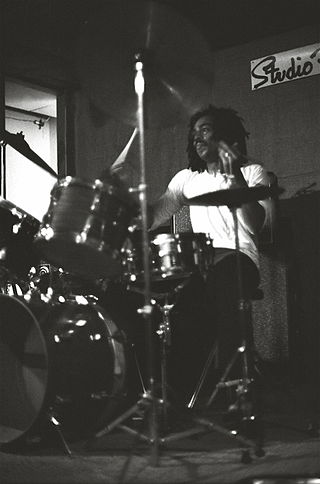
Charles Wesley "Bobo" Shaw was an American free jazz drummer, known as a prominent member of the Human Arts Ensemble and Black Artists Group. He was born in Pope, Mississippi, United States.
Baikida Carroll is an American jazz trumpeter.
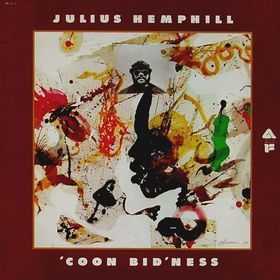
Coon Bid'ness is an album released by Julius Hemphill in 1975 on Arista featuring performances by Hemphill, Baikida Carroll, Abdul Wadud, Phillip Wilson, Arthur Blythe, Barry Altschul and Daniel Zebulon. The final track, "The Hard Blues," was recorded at the same recording session as Hemphill's debut album Dogon A.D.. After Hemphill's death in 1995, Freedom Records re-released the album as a CD under the name Reflections.
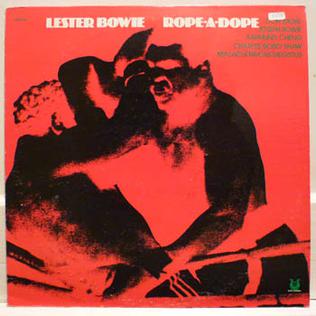
Rope-A-Dope is an album trumpeter Lester Bowie recorded for the Muse label and released in 1976. It features performances by Bowie, Joseph Bowie, Malachi Favors Maghostut, Don Moye, Charles Bobo Shaw and Raymund Cheng.

Non-Cognitive Aspects of the City: Live at the Iridium is a live album by the Art Ensemble of Chicago recorded in April, 2004 at the Iridium Jazz Club in New York City and released in 2006 on the Pi Recordings label. It features performances by Joseph Jarman, Roscoe Mitchell and Don Moye with trumpeter Corey Wilkes and bassist Jaribu Shahid replacing the late Lester Bowie and Malachi Favors Maghostut.

Mudfoot is the debut album by the all-star jazz group The Leaders released on the Black Hawk label in 1986. The album features performances by Lester Bowie, Chico Freeman, Arthur Blythe, Cecil McBee, Kirk Lightsey and Don Moye.

Inflation Blues is an album by Jack DeJohnette's Special Edition recorded in September 1982 and released on ECM the following year. The ensemble features reed players Chico Freeman and John Purcell, trumpeter Baikida Carroll, and bassist Rufus Reid.

Clevont Fitzhubert is an album by American jazz saxophonist Oliver Lake recorded in 1981 for the Italian Black Saint label.
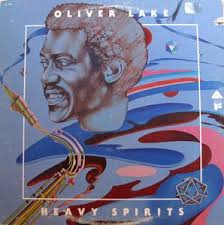
Heavy Spirits is an album by American jazz saxophonist Oliver Lake, which was recorded in 1975 and released on the Arista Freedom label. The album features Lake playing in different settings: three quintet tracks with Olu Dara on trumpet, Donald Smith on piano, Stafford James on bass, and Victor Lewis on drums, three more tracks with Lake backed by three violinists, a trio piece with trombonist Joseph Bowie and drummer Charles "Bobo" Shaw, and a solo sax piece.
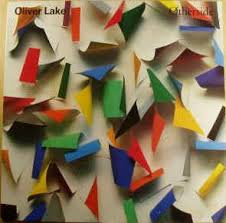
Otherside is an album by American jazz saxophonist Oliver Lake featuring a quintet and a big band, which was recorded in 1988 and released on the Gramavision label. The big band pieces were commissioned by the Jazz Coalition with funding from the Massachusetts Council on the Arts and Humanities New Works Program.
Floyd LeFlore (1940–2014) was a jazz composer, trumpet player, and poet from St. Louis. In 1968, LeFlore helped to found the Black Artists Group (BAG).

Wildflowers: The New York Loft Jazz Sessions is a series of five albums recorded May 14–23, 1976 at Studio Rivbea, a loft jazz space in New York City, run by Sam Rivers and his wife Bea. The albums include performances by groups led by musicians such as Hamiet Bluiett, Anthony Braxton, Marion Brown, Dave Burrell, Andrew Cyrille, Oliver Lake, Jimmy Lyons, Ken McIntyre, Kalaparusha Maurice McIntyre, Roscoe Mitchell, David Murray, Sunny Murray, Sam Rivers, Leo Smith, Henry Threadgill, and Randy Weston. The recordings were originally released in 1977 on the Douglas and Casablanca labels as five separate LPs, and were reissued in 1999 by Knit Classics as a 3-CD set.
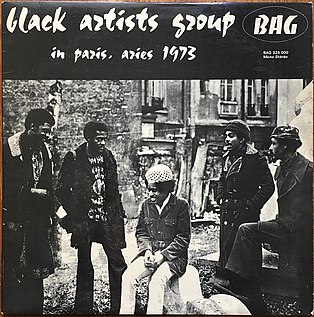
In Paris, Aries 1973 is a live album by the Black Artists Group, featuring saxophonist Oliver Lake, trumpeters Baikida Carroll and Floyd LeFlore, trombonist Joseph Bowie, and drummer Charles "Bobo" Shaw. The album was recorded in 1973 in Paris, and was initially self-released in very limited quantities. It was reissued in 2011 in a limited edition of 500 LPs by Rank and File Records, and was remastered and reissued on LP by Aguirre Records in 2018, with extensive liner notes by Julian Cowley, again in a limited edition of 500 copies.

Red, Black & Green is a live album by the Black Artists Group-affiliated band known as Solidarity Unit, Inc., led by drummer Charles "Bobo" Shaw. The group's sole release, it was recorded on September 18, 1970, at the BAG Room in East St. Louis, Illinois, and was initially issued on LP by Shaw's Universal Justice Records in 1972 as part of the BAG Live Concert Series. On the album, Shaw is joined by saxophonist and flutist Oliver Lake, trumpeters Floyd LeFlore and Baikida Carroll, trombonist Joseph Bowie, guitarist Richard Martin, pianist Clovis Bordeaux, bassists Kada Kayan and Carl Richardson, and percussionist Danny Trice. In 2008, the album was reissued on LP in remastered form and in limited quantities by Eremite Records.
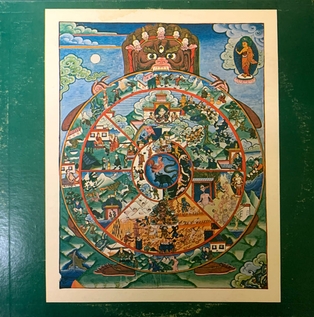
Whisper of Dharma is the debut album by the Human Arts Ensemble, a musical collective that was an offshoot of the St. Louis-based Black Artists Group. Consisting of two 22-minute pieces, it was recorded on October 6, 1972, in St. Louis, and was initially released later that year by the small Universal Justice label. In 1977, it was reissued by Arista/Freedom with different cover art. The album features drummer and group leader Charles "Bobo" Shaw, saxophonists Oliver Lake, J. D. Parran, and James Marshall, trumpeter Floyd LeFlore, trombonist Joseph Bowie, multi-instrumentalist Baikida Carroll, and percussionist Gene Lake, who was six years old at the time of the recording session. On the recording, the musicians supplemented their primary instruments with miscellaneous "small instruments" plus a Tibetan trumpet introduced by Marshall, who had just returned from a trip through India and Nepal.
















